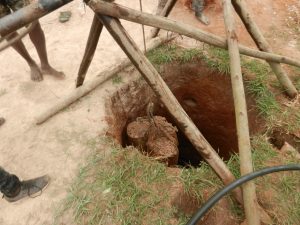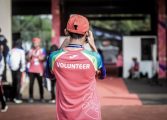By Page H. Gifford
Correspondent
It has been several years since a dedicated group of missionaries from Sts. Peter and Paul Church – including Robert Maher, Marisa Vacca, Cynthia Aycock, Doug Mullinex, Peter Coleman, and others – have been instrumental in building a village in Uganda.
They began the project by building the villagers a badly needed health center. Many people living in rural areas have no access to medical facilities which are miles from where they live. Also, the roads are in poor shape, mostly dirt roads riddled with potholes, and are only navigable by foot, bike, or motorcycle. Motorcycles are the only way doctors can get to patients faster in a limited time frame and make it easier for house calls.
The village not only has the health center, but a church with a rectory, a school and thanks again to the missionaries, a well and electricity.
“The extended utility poles and wires are three kilometers (one mile) to the village to give the health center, church, rectory, and school real power,” said Robert Maher. “It also gives the locals who live along the path of the lines to be able to tap into it.”
Fr. Gerald Musuubire, the former priest at Sts. Peter and Paul, now at St. Timothy’s in Tappahannock and Fr. David Martin Ssentamu, here at Sts. Peter and Paul, are both from Uganda and support the effort. Musuubire explained why in the 21st – century electricity seems like a luxurious commodity.
“Back in 2006, the candidate running for president promised to get electricity to these areas if the people voted for him.” He got elected and the people were left disappointed and with empty promises. With the help of the missionaries, the people put the electric poles in themselves by manual labor.
“The health center has been upgraded to a three (one below a hospital) by the Ministry of Health because it now has power,” said Maher.
 Now it has clean water too. Before the clean water well was dug, the people had to trek to a watering hole that they shared with wild animals or rely on a rainwater tank. The new well allows the villagers to have clean, uncontaminated water.
Now it has clean water too. Before the clean water well was dug, the people had to trek to a watering hole that they shared with wild animals or rely on a rainwater tank. The new well allows the villagers to have clean, uncontaminated water.
“The well was four feet by 150 feet and dug by hand,” said Maher.
Medical supplies are always constantly needed and in November of last year, they built a shipping crate and sent the village an ultrasound machine, vital signs monitor, and centrifuge, in addition to medical supplies and clothing. The ultrasound machine was donated by Fredericksburg Pregnancy Center and the University of Virginia donated the vital signs monitor. It arrived and was delivered this past February to an excited and grateful group of healthcare workers.
To date, there are no COVID-related cases but schools are closed. Doctors are all vaccinated and immunizations are up to 2,700 for the year. They have delivered a few babies, had 36 in-patient visits and 358 out-patient visits. The clinic can deliver babies and perform minor surgical procedures but nothing major.
When Americans are talking about progressive measures, upgrading and revamping or even re-imagining infrastructure for the 21st century, in remote areas of Africa, they have never known clean water or electricity, something many Americans take for granted.
Some may wonder why it is that missionaries often focus on remote areas of Africa. For centuries, Africa was ruled by other countries, and their resources plundered until they began to set-up governments that, in some cases, were not much better than the imperialistic rule of past centuries.
“The political leaders and politicians don’t want to share the resources,” said Musuubire. “Colonialism ravaged the continent but did nothing to help its people.” Africa lacks land reform and commercial agriculture, and this has hindered its people in prosperous economic development. He added that helping the people build these small areas of infrastructure goes a long way to giving them some independence and hope for a better future.
“So many remote areas, it’s a small piece but it makes a difference to them,” said Marisa Vacca. “I appreciate the U.S. When I come home.”
As for the people, they could teach many of us about appreciation and gratefulness.
“Their sense of community is much stronger than here in America,” said Doug Mullinex. “They are family-oriented not technology-driven.”
Cynthia Aycock echoes the same thoughts and feelings about volunteering and the people they are helping.
“We are changing the lives of these people,” she said.




